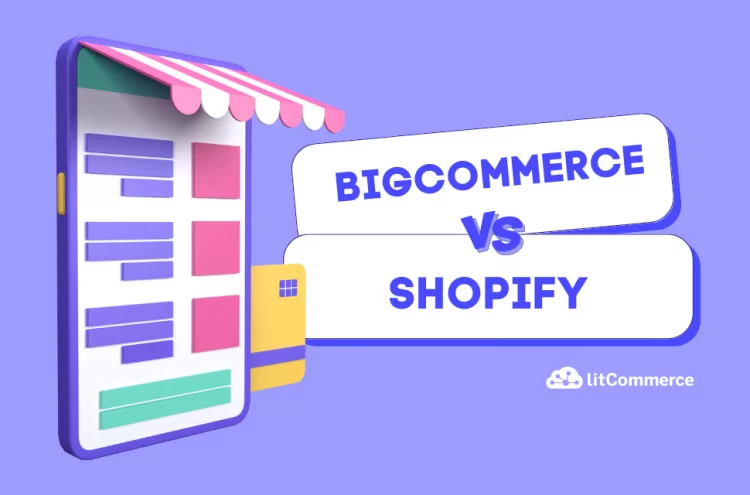When it comes to choosing an eCommerce platform, the debate of BigCommerce vs Shopify is a common one. Both platforms offer a range of features and benefits, but which one is right for your business?
In this article, we’ll explore the similarities and differences between BigCommerce and Shopify, helping you make an informed decision about which one to choose. We’ll also provide a comprehensive overview of these two selling platforms, including:
- The overview of the two eCommerce platforms
- A quick comparison between Shopify & BigCommerce
- And the key differences between them.
Without any delay, we’ll start the comparison now!
Shopify vs BigCommerce: An Overview
Before diving into the detailed comparison, let’s take a overall look at BigCommerce vs Shopify, as well as their advantages and disadvantages.
What is Shopify?

Founded in 2006, Shopify is an all-in-one eCommerce platform that makes it easy for anyone to start and grow an online business. It currently has the highest market share in the US eCommerce platform market with over 4 million users across 175 countries. Popular brands such as Gymshark, Red Bull, and Lindt have been running their eCommerce sites with Shopify.
With a user-friendly interface, even those with limited technical knowledge can quickly set up a Shopify store. To make it even easier, Shopify offers a 3-day free trial and a special deal of $1/month for the first 3 months. With impressive growth rates, Shopify continues to be a leading platform for online businesses.
Shopify Pros & Cons
Below are some Shopify pros and cons you may consider before making your purchase decision.
Shopify Pros:
- User-friendly interface, making it easy to set up and manage an online store;
- 120+ themes and 8,000+ apps for customization;
- 24/7 customer support and community forums;
- Secure payment processing and easy integration with popular payment gateways;
- Mobile-responsive design and optimized for SEO;
- Offers multi-channel selling capabilities for social media and marketplaces.
Shopify Cons:
- Limited design customization options for advanced users;
- Transaction fees for using third-party payment gateways.
What is BigCommerce?

BigCommerce is a leading hosted eCommerce solution that helps businesses with brick-and-mortar stores to expand to eCommerce sales channels quickly. While not an open-source platform, BigCommerce offers powerful built-in features and open APIs, making it an ideal solution for those who want to customize within a hosted environment.
BigCommerce’s users range from startups to high-profile companies such as Toyota, Bliss, and DressUp.
BigCommerce Pros & Cons
That said, there are possible pros and cons of BigCommerce that might affect your platform choice. Scroll down for details or browse our detailed BigCommerce reviews for more information.
BigCommerce Pros:
- Rich built-in features, open APIs, lower additional costs, and customization functions;
- A versatile solution allows owners to access and modify the underlying code in stores;
- No transaction fees in all BigCommerce plans, unlike Shopify;
- Flexible themes are available in the BigCommerce Stencil theme engine.
BigCommerce Cons:
- Built-in features require more technical skills compared to Shopify’s user-friendliness;
- Fewer theme options are available compared to Shopify.
BigCommerce vs Shopify: A Side-by-Side Comparison
Here’s a brief version of the BigCommerce vs Shopify comparison.
Features | BigCommerce | Shopify |
Pricing | Plans start at $39-$399 per month | Plans start at $25-$399 per month |
Ease of use | User-friendly interface with a steeper learning curve | User-friendly drag-and-drop interface, easier to use than BigCommerce |
Theme & Design | 170 customizable templates with limited third-party options | 120+ customizable templates, with a larger selection (1600+) of third-party options |
Sales features | Built-in SEO features, abandoned cart recovery, and inventory management | Comprehensive eCommerce features, including multi-currency support and customer reviews |
Payment gateways | Over 65 payment gateways are available | Over 100 payment gateways are available |
Apps & Scalability | Over 1,000 apps with a focus on enterprise-level scalability | 8,000+ apps with a focus on scalability for small to medium-sized businesses |
BigCommerce or Shopify: Breaking Down the Key Differences
In this article, we will make a thorough BigCommerce vs Shopify comparison, highlighting their key differences to help you make an informed decision for your business.
#1. Pricing plans
BigCommerce pricing
BigCommerce pricing plans are designed for businesses of different sizes and requirements.
BigCommerce Pricing | Monthly subscription | Yearly subscription |
Standard | $39 | $29 |
Plus | $105 | $79 |
Pro | $399 | $299 |
Enterprise | Custom | Custom |
The Standard plan ($39 per month) includes unlimited staff accounts, product listings, file storage, and real-time shipping quotes. The Plus plan ($105 per month) adds more advanced features, such as customer grouping, custom SSL, and abandoned cart saver. For businesses requiring even more advanced features, the Pro plan costs $399 per month and includes Google customer reviews and faceted searches. Finally, for businesses with custom requirements, BigCommerce offers the Enterprise plan with custom pricing.
BigCommerce has huge advantages over competitors, including the absence of transaction fees, unlimited bandwidth and file storage, unlimited product variants, and staff accounts. Additionally, businesses using BigCommerce can take advantage of PayPal’s exclusive fee rates.
Shopify pricing
If you’re interested in signing up for Shopify, you might be wondering: how much is Shopify going to cost me? Well, Shopify comes with three main pricing options for different business sizes and requirements.
Shopify pricing plans | Monthly fees | Annual fees (Save 25%) |
Basic | $39/month | $29/month |
Shopify | $105/month | $79/month |
Advanced | $399/month | $299/month |
The Basic Shopify plan ($39 per month) includes additional features such as fraud analysis, abandoned cart recovery, and a discount code engine. Besides, the Shopify plan ($105 per month) adds even more advanced features, including gift cards and professional reports. For businesses requiring even more advanced features, the Advanced Shopify plan ($399 per month) includes advanced report building, real-time carrier shipping, and up to 15 staff accounts.
If you are searching for an enterprise-level plan with catered-to-need requirements, Shopify Plus (from $2,000 upwards) is available for your consideration.
Both BigCommerce and Shopify pricing plans are value for money. While BigCommerce has a broader range of built-in tools and doesn’t charge any transaction fees, Shopify’s pricing is slightly lower and offers discounts for students and non-profit organizations.
#2. Ease of use
When comparing BigCommerce vs Shopify, it is crucial to consider the ease of use, as this factor is significant for both novice and experienced eCommerce merchants.
BigCommerce
BigCommerce is a platform that caters to users with varying levels of experience in building websites. Its versatility enables developers to modify code and build from scratch, while beginners can benefit from out-of-the-box functions to grow their businesses.
Although it may take some time to understand the platform, BigCommerce has improved its user interface, making it more user-friendly. The drag-and-drop feature on BigCommerce provides more design flexibility than Shopify’s list-based feature.
Shopify
Shopify is a user-friendly platform that makes it easy for beginners to set up an online store. Its dashboard is easy to navigate and has different sections built for users, making editing the store more straightforward.
Noticeably, Shopify’s onboarding process is praised by most users, as it’s straightforward and guides you through each step of setting up your store. With its left-hand main menu, you can access all the options you need, and its wizard helps you create your store in a few clicks. While
Moreover, Shopify edges out with its minimal and straightforward dashboard. With a free trial available, anyone can test Shopify and explore the platform’s features before deciding to invest.
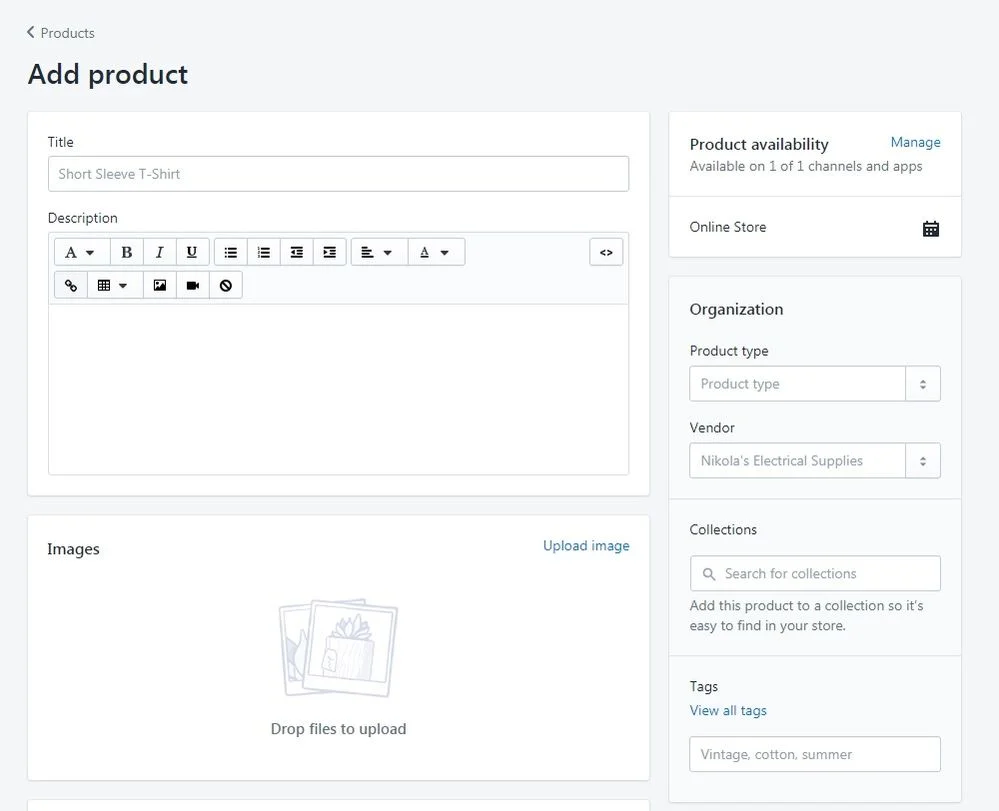
Shopify is generally considered to be the more user-friendly platform, particularly for beginners. On the other hand, BigCommerce offers a powerful feature set, but it also comes with steeper learning curves to learn and use effectively.
#3. Theme & Design
Naturally, you would want your store to have an appealing appearance to attract potential customers and encourage purchases. Let’s take a look at how the store design options compare between BigCommerce vs Shopify.
BigCommerce themes
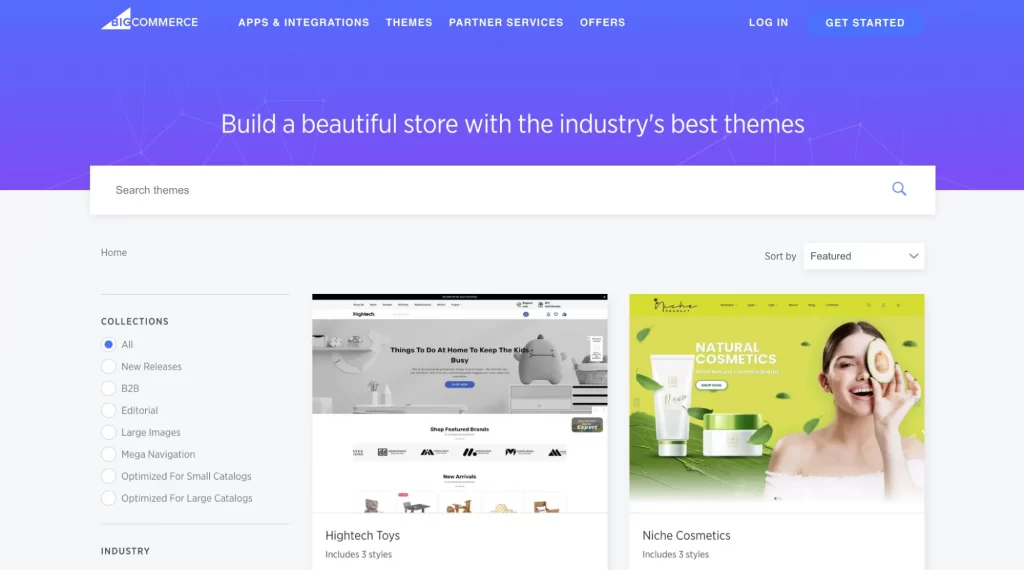
BigCommerce offers about 170 decent themes in its theme store, with options categorized by industry, layout, and price. While there are fewer industries to choose from compared to Shopify, the available themes are still diverse and cover a range of businesses.
For those just starting out or on a tight budget, BigCommerce’s free themes are a great option. These themes offer a basic but functional design that can be customized to fit a specific brand or style.
Moreover, for those looking for a more professional or unique look, paid themes are available at prices ranging from $150 to $399. These themes offer a wider range of customization options and can help a business stand out in a crowded market.
Both free and paid BigCommerce themes are well-optimized for mobile browsing, delivering a seamless experience to users.
Shopify themes
Shopify comes with 120+ themes for different industries and styles on the Shopify Themes Store. The themes are priced from $100 to $350 and are easy to find by searching via layout, size of the store, industry, navigation style, and more.
Both paid and free Shopify themes are available and have a modern and professional look. They are all optimized to display well on different screen sizes and devices. This is important as an increasing number of shoppers use mobile devices to browse and shop online.
In terms of customization, Shopify’s themes are user-friendly and offer superb levels of personalization. Users can easily modify the themes to match their brand and create a unique online store.
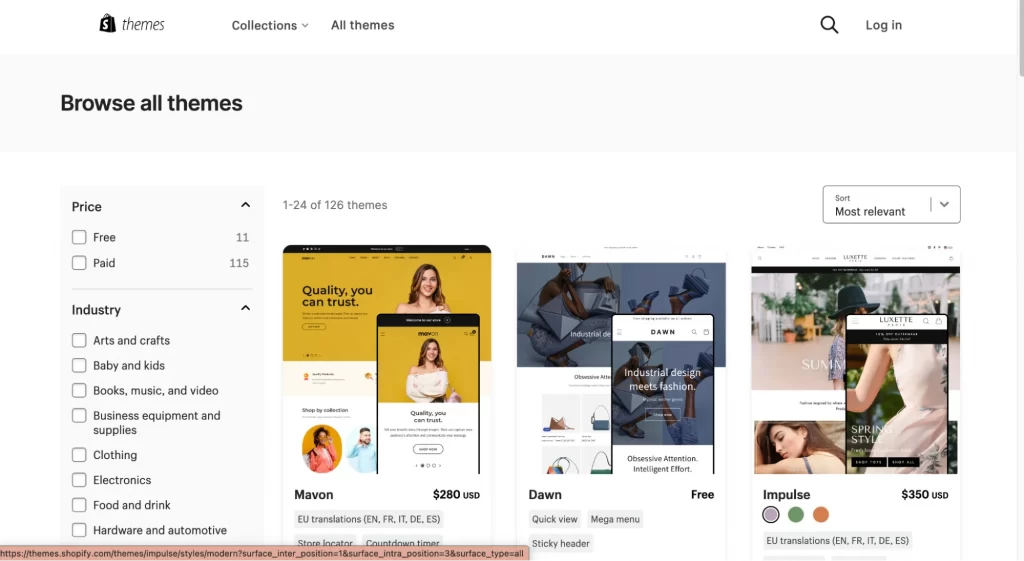
Shopify wins the battle in terms of themes and designs due to its wide range of modern and mobile-responsive themes available for free or at an affordable cost.
#4. Sales features
In terms of sales features, we’ll explore the differences between BigCommerce vs Shopify in three aspects: inventory management, sales channels, and POS.
A. Inventory Management
BigCommerce provides an uncomplicated and robust inventory management system, which helps track stock levels and order trends. Its integration between online and offline channels allows seamless inventory management. In addition, BigCommerce enables sellers to sell physical, digital, and service-based products without relying on third-party apps.
On the other hand, Shopify’s inventory section allows setting up inventory tracking, monitoring inventory levels, and modifying inventory counts. It also facilitates tracking the history of inventory adjustments for product variants. Additionally, you can leverage Shopify inventory management apps for tracking and fulfilling orders with minimal effort.
B. Sales channels
BigCommerce has the Channel Manager solution, which simplifies multichannel selling and helps merchants increase sales. It enables them to connect their stores with various sales channels, including marketplaces (e.g., Walmart, Amazon, eBay), social channels (e.g., Facebook, Google), and others.
Similarly, Shopify supports selling products on multiple online sales channels (Facebook, Amazon, eBay, Instagram, etc,.) by connecting them to the platform. This way, sellers can manage their products, orders, and customers in one place. Besides, users can leverage Shopify POS to sell in brick-and-mortar stores, pop-up shops, and markets.
C. Point-of-sale (POS)
BigCommerce allows you to connect with any POS providers, such as ConnectPOS, Hike, and Vend, and sell online and offline without additional fees. You can manage your product catalogs from a single location and synchronize your inventory across all channels. Many POS integrations offer integrated payment processing both online and offline.
Meanwhile, Shopify provides Shopify POS, a point-of-sale system application for IOS and Android that is directly available from Shopify. This feature allows you to sell your products in person.
When it comes to sales features, both platforms provide all of the features that an online store will require. Nevertheless, BigCommerce outperforms Shopify due to its richer built-in toolset. While Shopify’s sales features are more adaptable, BigCommerce offers a more comprehensive range of features from the start.
#5. Payment Gateways
BigCommerce
BigCommerce offers a range of payment gateway integrations through its app store, with 65+ options available in over 100+ countries. These include popular choices like Paypal, Amazon Pay, Square, and Stripe, as well as many local payment methods.
What sets BigCommerce apart is its focus on providing a seamless payment experience for customers. It ensures secure and smooth transactions with no transaction fees and PCI compliance.
Moreover, the payment gateways are optimized for mobile devices, enabling shoppers to make payments on the go. With BigCommerce, you can easily set up payment processing with the payment gateway of your choice, offering your customers the flexibility to choose their preferred payment method.
Shopify
Shopify offers an in-house payment provider, Shopify Payments, which provides quick, secure, and easy transactions for buyers and sellers on the platform. It also includes fraud analysis to prevent any suspicious activities. Shopify Payments has no transaction fees or hidden costs and integrates fully with the platform.
Additionally, Shopify supports over 100 external payment gateways, including popular options like PayPal and Stripe, giving sellers a variety of choices.
BigCommerce is the outperformer, with no transaction fees on all its plans. Meanwhile, when selling on Shopify, transaction fees will be applied if you don’t use Shopify Payments.
#6. Apps & Integrations
Both these two platforms have their own app stores where users can browse and download various third-party applications to enhance their online store’s functionality. But let’s see who wins between BigCommerce vs Shopify in terms of apps and integrations.
BigCommerce
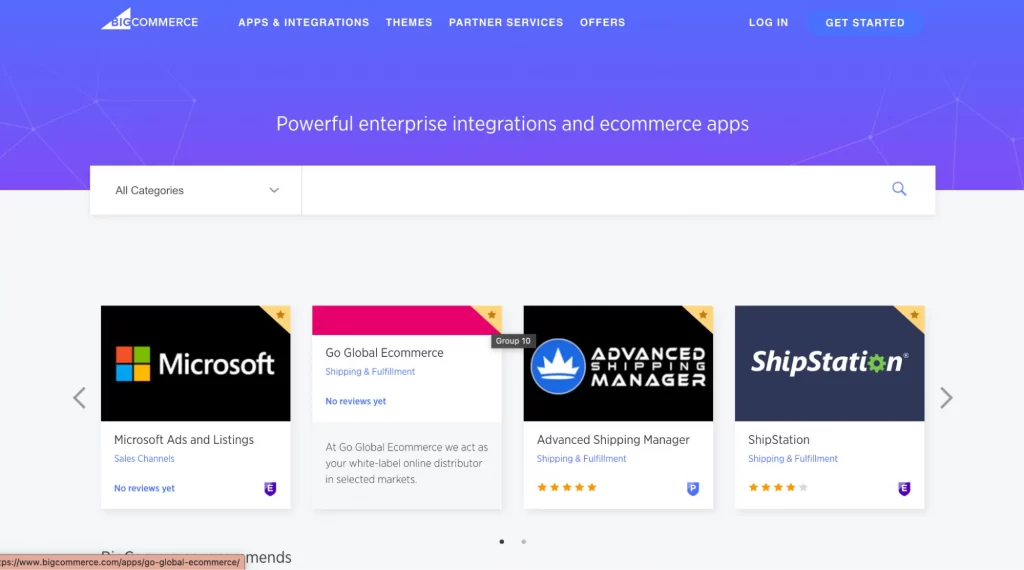
BigCommerce offers over 1000 apps across various categories such as Accounting & Tax, Checkout, and Payment & Security. These apps allow users to customize and enhance their online stores.
Moreover, BigCommerce is highly scalable, thanks to its multi-storefront, deep integration with Google products, and custom consulting management. These features make it easy for businesses to expand and manage multiple storefronts.
Shopify
This platform boasts a massive app store, with over 8000 paid and free Shopify apps available to enhance your online business. There is an app for every need, from product import apps (like BulkFlow) to store design tools and marketing features.
Shopify App Store also allows you to filter apps by category or popularity, making it easy to find the right app for your store. If you’re unsure which app is best for you, there are reviews available to help guide your decision.
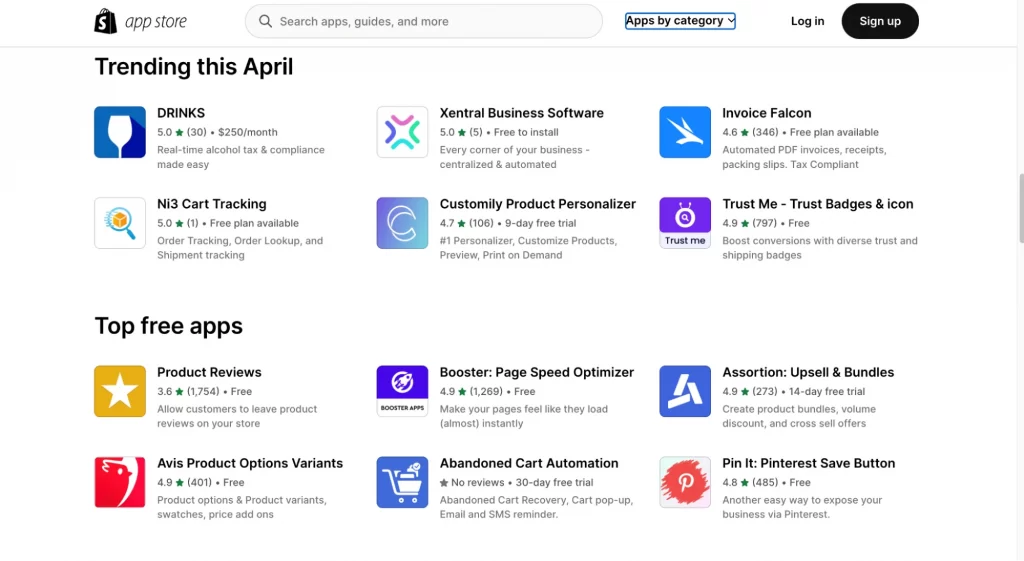
Shopify is highly advantageous for those who want more app options. With more than 8,000 current apps, you may always find a solution for your store’s needs.
BigCommerce vs Shopify: FAQs
- How is BigCommerce different from Shopify?
Both of them are eCommerce platforms that enable businesses to create online stores. However, there are some differences between BigCommerce vs Shopify.
BigCommerce offers a range of built-in features, while Shopify has a vast app store with more than 8,000 apps. BigCommerce is known for being more favorable for B2B businesses and has a more robust set of sales tools, while Shopify is popular for its user-friendly interface and built-in payment gateway.
- Should I switch from BigCommerce to Shopify?
Whether to switch from BigCommerce to Shopify depends on your specific needs and priorities. If you’re looking for a platform with a more extensive app store, user-friendly interface, and built-in payment gateway, Shopify may be the better option. On the other hand, if you’re seeking a platform with more built-in features and tools, especially for B2B businesses, BigCommerce may be the better choice.
- What are Shopify competitors?
Some of the popular competitors of Shopify in the eCommerce platform market include BigCommerce, WooCommerce, Magento, Squarespace, Wix, OpenCart, etc.
Each of these platforms has its own unique features and pricing plans that cater to different business needs and budgets. It’s important to research and compare the features, pricing, and customer support offered by each platform before making a decision on which one to use for your online store.
Wrapping Up
Through this Bigcommerce vs Shopify comparison, we can see they are great options for building an online store. BigCommerce offers more built-in features and is better for scalability, especially for larger enterprises. On the other hand, Shopify has a larger app store and is more customizable, making it a good option for small to medium-sized businesses.
Ultimately, it depends on your specific needs and preferences. Consider factors such as budget, design, sales features, and scalability when making your decision. We hope this comparison has helped you in making an informed decision on which platform to choose for your online business.
Join the LitCommerce community today to stay up-to-date with the latest retail trends and best practices. Plus, check out our Retailers Blog for even more valuable resources and expert advice on how to grow your business. Don’t wait – start achieving your retail goals with LitCommerce now!

